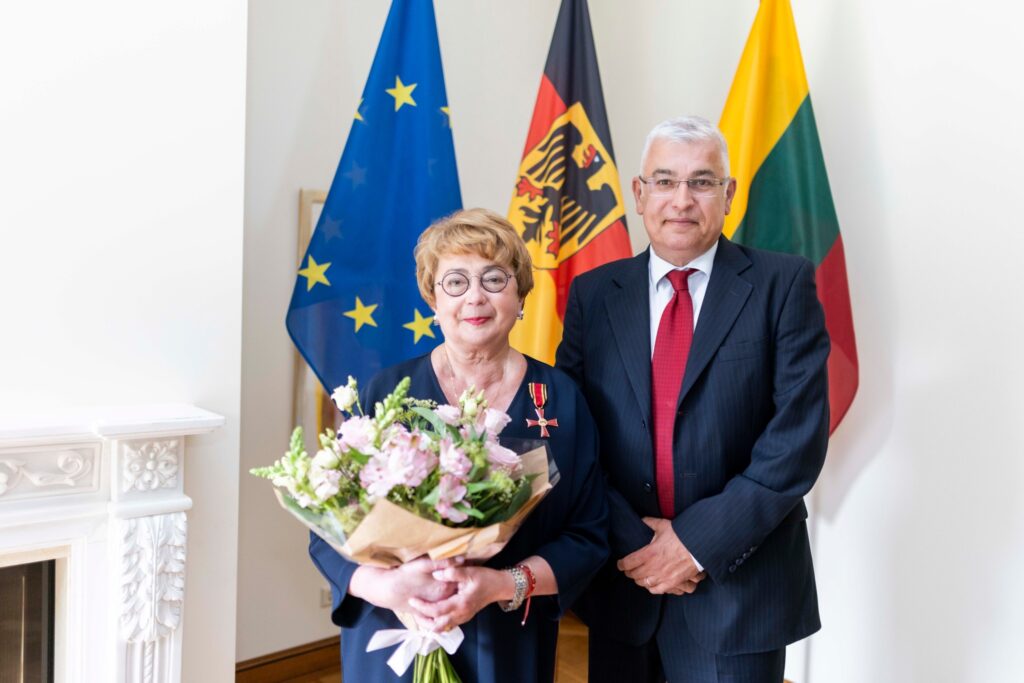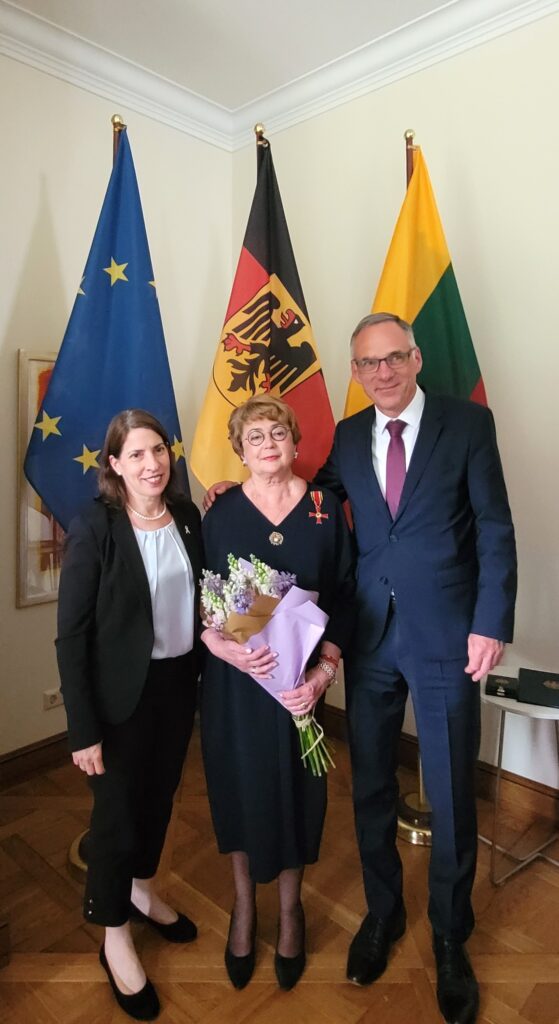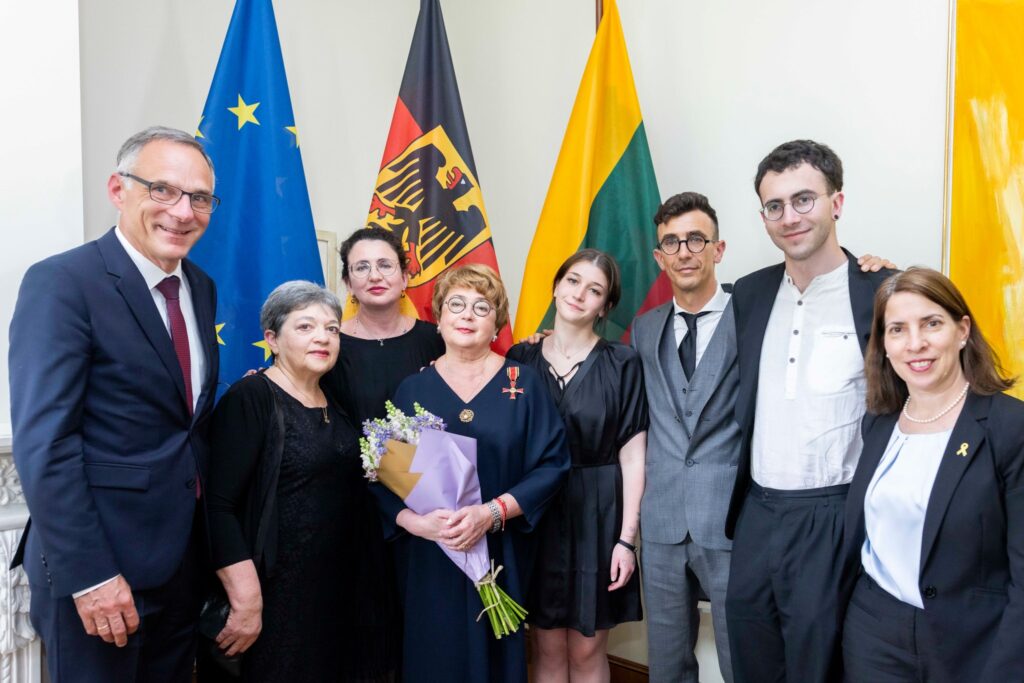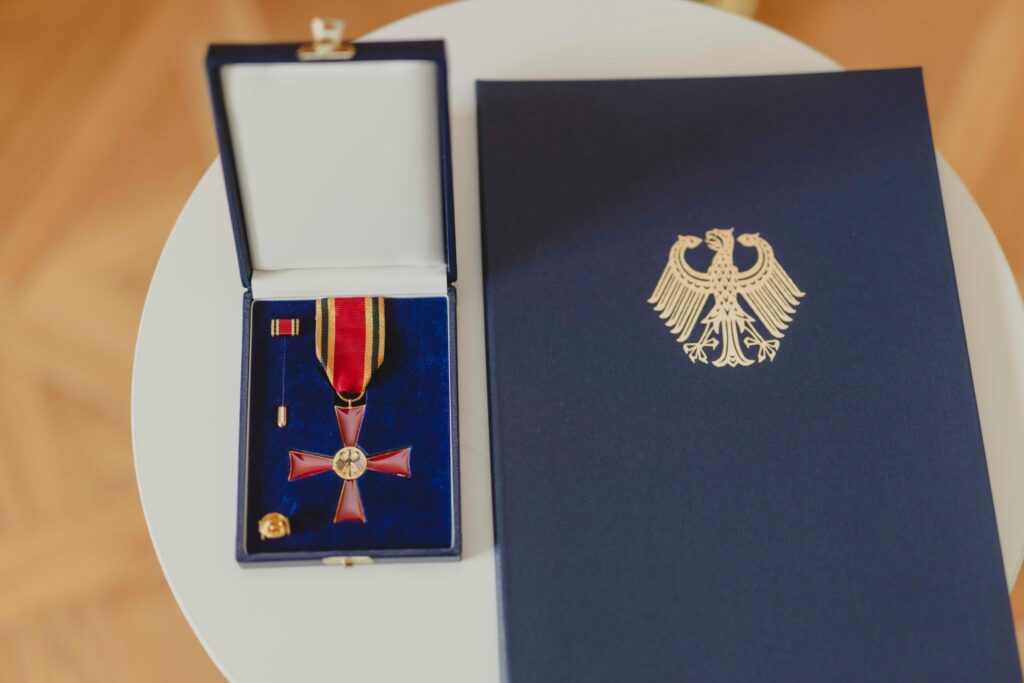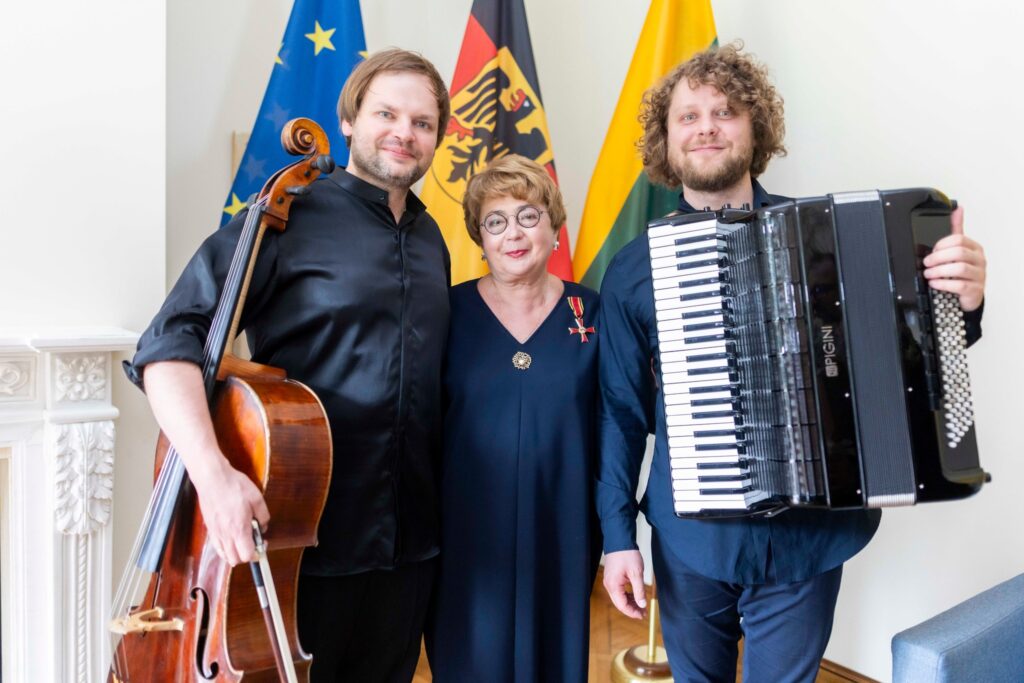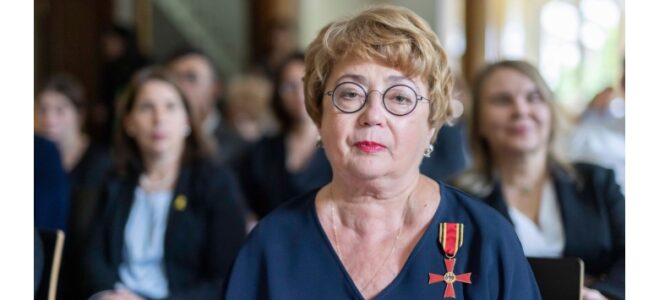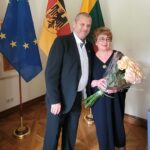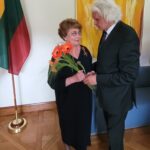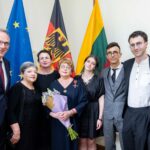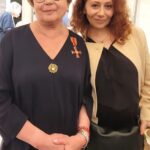Yesterday, on historic D-Day, “decision day” marking the entry of the western Allies into Nazi-occupied France and the beginning of the end for Nazi Germany, German ambassador to Lithuania Cornelius Zimmermann presented Lithuanian Jewish Community chairwoman Faina Kukliansky the Order of Merit from the Federal Republic of Germany for her tireless work commemorating Lithuanian Holocaust victims and long-term efforts to unite the LJC including enhancing the organization’s role on the national and international level.
Ambassador Zimmermann presented the honor, saying Germany’s responsibility for the Holocaust will remain forever. He said the Holocaust was a barbaric crime against humanity which led to the death of 95% of the Lithuanian Jewish community. He also said the small Litvak community which survives plays an important role in Lithuanian political life and in the international community, thanks to the efforts of the exceptional person occupying the post of leadership at the LJC.
“I received this award truly not only because my parents were imprisoned in a ghetto and experienced other horrors of the Holocaust, along with other Lithuanian Jews. Their children are not presented medals because of that. I hope this award is an evaluation of preserving memory. I’m not the only person doing this, each of our communities in every region where they have been established are doing everything possible to maintain the old cemeteries and restore synagogues. Sometimes I’m asked why we are doing this if there are no Jews left in the towns anyway. In order to preserve their memory. We no longer possess our parents’ candelabra which every family had for lighting the Sabbath candles. The only thing we have left is memory and respect, and not just self-respect, but also that of the state of Germany which, despite the tragic lessons of history, today is a shining example in many regards. I truly cherish this award because it wasn’t presented to me personally but as an assessment of the work by the entire Jewish community,” chairwoman Kukliansky said, thanking the German president, ambassador Zimmermann and previous German ambassador to Lithuania Matthias Sohn.
Sergejus Kanovičius delivered a laudation, a praise-filled oration, on behalf of chairwoman Kukliansky as well, an unofficial translation of which can be found below. Following the official award ceremony on D-Day, friends and colleagues congratulated the chairwoman and presented bouquets of flowers. Cellist Glebas Pyšniakas and accordion-player Tadas Motiečius performed some of Kukliansky’s favorite songs.
Laudation by Sergejus Kanovičius:
“Your excellencies, ladies and gentlemen,
I’ve written everything in my life, from plays to articles to poetry. I’m never written a laudation, or panegyric. I have no experience in this, and I can’t lie, placate or exaggerate.
I was pleasantly and unexpectedly surprised when asked to write a laudation for my old acquaintance Faina Kukliansky, attorney, lobbyist and long-time chairwoman of the Lithuanian Jewish Community, on the occasion of her being presented the Order of Merit from the Federal Republic of Germany.
What must the daughter of Holocaust survivors have felt when she learned she was receiving a reward from the country whose predecessors had tried to murder not just her entire family, but all Jews? Faina confided in me she was taken aback by this, and wasn’t sure what to do. If I can be permitted the indiscretion, I will tell you, your excellencies, ladies and gentlemen: Faina asked her relatives, all of them, close and distant, what she should do, whether it was appropriate to accept this award when your parents where imprisoned the Šiauliai ghetto, when your grandparents pulled out their gold teeth in order to ransom their child, when you family the Grodno ghetto, the Maidanek, Dachau and Stutthof death camps.
Faina’s relatives, close and distant, approved the idea of her accepting this medal, and that’s why I’m here today as well. In order to pay respect to Faina’s relatives who survived, and also to those who can never receive medals again, all of the murdered Jews of Lithuania.
We have also gathered to pay our respects to the Federal Republic of Germany for setting the moral example of how a modern society and its political leaders should deal with an uncomfortable past. We understand full well that it is difficult but necessary to accept at least moral guilt and responsibility for crimes which today’s residents of Germany did not commit. And this is more than just a moral example: it’s sufficient to visit any Jewish museum in Germany or Wannsee, where the Final Solution was hatched, to see how German society of today is encouraged confidently and courageously to learn from the black pages of history of the past.
The Lithuanian Jewish Community and its activities are inextricably linked with person of Faina over the last decade and no one really understands how she manages to be everywhere at once, at Government House, in the parliament, at the Community and attending events. Likewise the progress made in connection with the Jewish cultural heritage and the daily life of the Jewish community is inconceivable without Faina’s leadership.
I for one am not jealous of Faina and the duties she performs. It should be said Faina also has to adopt the uncomfortable role of beggar wherever she goes, whether it’s to the city council which isn’t maintaining Jewish cemeteries and mass murder sites, or to the Government over the lack of completion of the Ponar Memorial Complex or the still-standing memorial commemorating the murderers of Jews and their ideologists.
Jews asking for and demanding justice are more than just irritants. In the context of the Holocaust in Lithuania this is, to put it very kindly, a misunderstanding. No one likes criticism. But Faina knows, as my late father, may he rest in peace, used to say, that you only have to say the truth once, whereas lies must be repeated continuously. She attempts to tell those who are responsible for the historical memory and moral state of Lithuanian society that they should stop lying, that they need to act differently, as the Federal Republic of Germany does, by saying the truth and moving forward from there. Truth is the guarantor of the state, while the lie undermines the state and society from within.
Faina is a Litvak. Litvaks are known for their stubbornness and inflexible character, and I don’t bend to injustice. Faina’s greatest achievement is that she stubbornly seeks justice, for living Jews and for Jews murdered.
It is my honor to participate in this ceremony. Both Faina and the country presenting the award are examples of true civil morality.
Thank you”.
About the awardee:
Faina Kukliansky comes from a Lithuanian Jewish family that survived the Holocaust in the small town of Veisiejai. Her grandmother was killed during the Holocaust, but her father survived. Her mother’s family also suffered greatly during this tragedy. Mrs. Kukliansky holds a law degree and works as an attorney, and she is also a registered lobbyist. In 2013, she was elected as a Chairwoman of the Lithuanian Jewish (Litvak) Community; up until 2017, and she also served as Chairwoman of the Vilnius Jewish Community. Additionally, Mrs. Kukliansky is a member of the Executive Committee of the European Jewish Congress (EJC) and is part of the Litvak diaspora delegation in Israel.
Mrs. Kukliansky has previously been awarded the Officer’s Cross of the Order for Merits to Lithuania; an award from the YIVO Institute for Jewish Research for her contributions to strengthening the Jewish community in Lithuania; and the Lithuanian Diplomacy Star.
Moments of the evening – in the photo gallery by Irmantas Gelūnas and LJC.
Photographs by Irmantas Gelūnas and by LJC staff.

